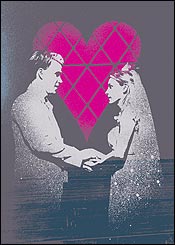
In these days of art-by-committee, everyone misses the impresario, the single-minded creator who yields to no one but his muse. But what if such a figure were to return, poised to blast apart our cozy, corporate Broadway? What if he appeared—and he had no taste?
All I know of Joe Brooks is In My Life, the new musical that is almost entirely his creation. He wrote the script and the songs, and directed its world premiere. And while it may be that Joe Brooks has very fine taste indeed—he may, for instance, have a keen appreciation of wine—judging by his treatment of words, music, and the fluttery motion of the human heart, I suspect that his would be one cellar to avoid.
This is not the worst musical ever, the bloodthirsty around Broadway will be sorry to hear. It’s not even the worst in recent memory. Of course, drawing any comparisons to this show proves tricky. Brooks has spun a slapdash love story about a songwriter with Tourette’s syndrome and a personals editor at the Village Voice, one that features trips to heaven, a dance break with a skeleton, an Italian aria, a God figure named “Al,” and a Dada-ish reliance on lemons. This is a show that manages to be dispiriting and tiresome in a manner all its own.
I wonder: Could someone deduce, without knowing ahead of time, that the creator of this show has made a living by writing jingles for commercials? There are some prominent tips here, like the time God and an angel fashion an extended duet from a Dr Pepper ad. More fascinating are the subtle hints. As one bizarre episode gives way to the next, it becomes clear that the sensibility of the 30-second spot has doomed the entire project.
For although the show may strike you as a mere burst of metaphysical whimsy—William Blake with a happy song to sing—it has loftier aims. Joe Brooks aspires to profundity. He intends the love story and its cascading, improbable subplots to illustrate how tenuous our happiness can be. But he treats his subject with a remarkable inability to concentrate. In the opening number, we hear, several dozen times, that “life turns on a dime.” Later in the show, a lyric changes the metaphor: “Life is only a ride on the wheel.” (This comes moments after the observation that “We all are just players in the game,” and moments before “We’re all players in the band.”) The finale tells us we all must travel “the road of life.”
Yes, yes, you’re right, picking on the banality and inconsistency of Broadway lyrics is about as honorable—and as taxing—as roughing up a 10-year-old to get her iPod. But in this case, the weakness of the writing points out weaknesses in the thinking. Having a character burst into tirades of profanity does wonders for narrative rhythm, all right. Still: Might there be a subtler way to depict Tourette’s?
The really superficial stroke is Winston, the story’s nemesis. Wildly queer, he is an accountant turned angel who wreaks havoc on the couple, seeking material for his “reality opera” in heaven. It is a dismaying cartoon, mixing a debased version of Oscar Wilde’s wit, the costumes of Ziggy Stardust, and crudely stereotyped behavior beyond even Pat Robertson’s darkest imaginings. The terrific David Turner may not find much dignity in the caricature—Gielgud couldn’t manage that trick—but his ad-libs spark some needed laughs.
What really grates about the show’s clanging failure is the sprinkling of miscarried promise. Brooks has a way with melodies, even the ones not originally intended to sell Volkswagens. Also, who doesn’t enjoy a nonsensical, pointless pirate interlude? Best of all, he turned loose some very impressive designers, and got back some very impressive designs; a show so tedious has no business looking so good. If he had enlisted a few other skilled accomplices—a librettist would have been a good start—he and his one anonymous backer might have enjoyed the kind of freewheeling impresario’s triumph that Broadway needs. As with George Lucas, you marvel that a man can have so many wonderful toys, and so little idea how to use them.

Say what you will about Joe Brooks: He knows how to hook you. Having studied at Juilliard, he wrote the Oscar-winning (and very catchy) theme to the 1977 film You Light Up My Life (which he wrote, directed, and acted in), as well as the score to The Garden of the Finzi-Continis. His most memorable success, though, was on Madison Avenue, where Brooks was responsible for “Aren’t You Glad You Use Dial?” and one iteration of “Maxwell House: Good to the Last Drop.” But one of his favorite jingles was for a product with an image problem he must surely identify with these days. It was for Dr Pepper: “So Misunderstood.”
In My Life
By Joe Brooks.
Music Box Theatre.